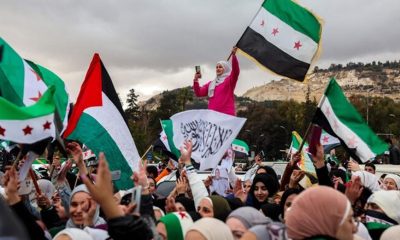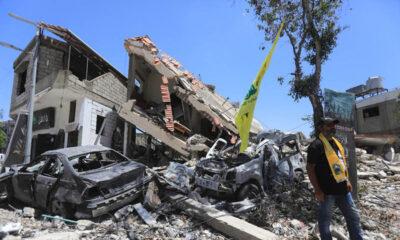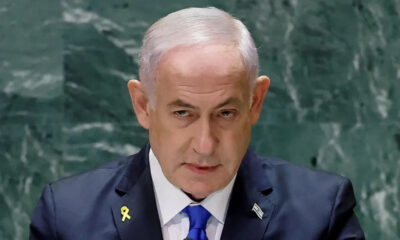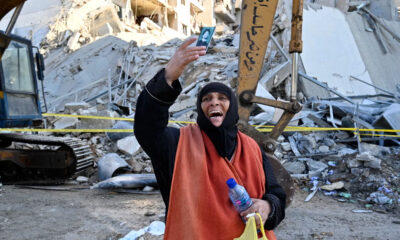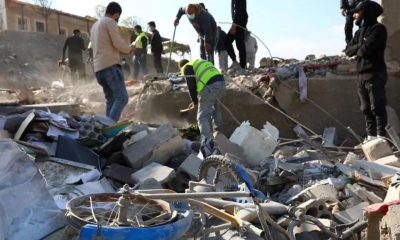International
Hundreds killed in first 10 days of hostilities in south Lebanon
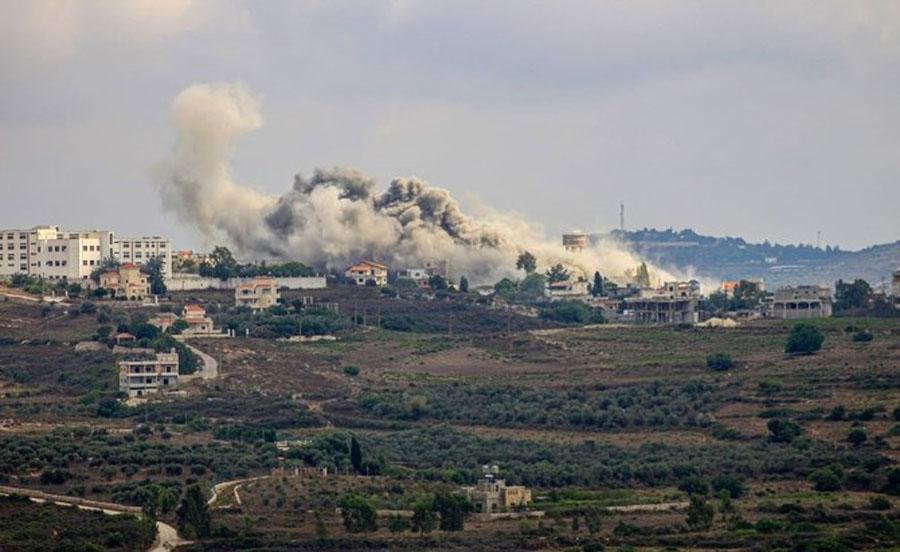
Hundreds killed in first 10 days of hostilities in south Lebanon
BEIRUT: Thousands of attacks on South Lebanon have resulted in the death of nearly 540 people and hundreds more injured since hostilities began on July 15, according to MP Fadi Alama, the head of the Foreign Affairs Committee in the Lebanese parliament.
The MP said 538 people had died and 1,850 injured in the 5,736 attacks.
The Foreign Affairs Committee met on Wednesday with several ambassadors from the EU, Switzerland, Norway, Britain, and Canada to present the results of the ongoing Israeli attacks on southern Lebanon, as part of preparations for “the government’s work in the post-ceasefire phase.”
MP Alama said that “representatives of diplomatic missions and international organizations were surprised when we talked about 1,800 hectares intentionally burned by the Israeli enemy. They were also surprised by the number of schools that were targeted and the number of students who were unable to complete their education and moved to other places. Additionally, they were informed of the 28,000 new families who have been displaced from areas that are being targeted daily.”
The parliamentarian said there was urgency for the government to develop a plan and a roadmap as soon as possible.
MP Wael Abu Faour, a member of the Parliamentary Foreign Affairs Committee, stated that “the human, health, urban, agricultural, and environmental losses as a result of Israeli attacks have become enormous. Initial estimates from Lebanese institutions indicate a cost of approximately two $2 billion so far, in addition to other damages and losses.”
Abu Faour said: “This is a new challenge for the Lebanese state that must be dealt with in Lebanon’s Arab and international relations. The state is bankrupt and unable to bear such responsibilities, but at the same time, it cannot abandon its responsibilities towards its citizens regardless of any controversial local political considerations regarding the feasibility of war or its justifications among some parties.”
Hostilities between Hezbollah and the Israeli army continued on Wednesday. According to Israeli media, “43 settlements were evacuated in the north, (and) more than 1,500 buildings, cars, and infrastructure were damaged in the north. Additionally, six industrial zones were affected, and hundreds of businesses were forced to close due to Hezbollah strikes.”
READ ALSO:
- US Congress cheers Netanyahu address, protesters gather to denounce it
- HIV prevention: Experts excited about trial results of injectable Lenacapavir
- Hardship: Nigerian students gear up for nationwide protest
Israel targeted the towns of Kafr Shuba, Tayr Harfa, and Hula on Wednesday with airstrikes and artillery shelling. A raid also targeted a house in the town of Kfar Hammam, leading to its destruction. This small village is located in Hasbaya District on the eastern side of Nabatieh Governorate.
Hezbollah released a new video recorded by the Hudhud drone within Israel, showcasing footage from inside the Ramat David Air Base, located approximately 50 km from the Lebanese border.
According to Hezbollah, “the footage was captured on Tuesday using a drone.”
The new eight-minute video released by Hezbollah showcases several sensitive areas within the base, including aircraft fuel tanks, the headquarters of Squadron 109, an Iron Dome missile defense platform, and ammunition depots. It also reveals the locations of the Squadron 157 and Squadron 105 headquarters. Hezbollah included an image of the base commander’s office, exposing intricate details of the facility.
This is not the first time Hezbollah has employed such tactics. Previously, the group broadcast aerial footage of critical installations captured by similar unmanned aerial vehicles in Haifa and the Golan Heights.
Israeli media reacted strongly, with one outlet stating: “Over eight minutes of Hezbollah video exposing our vulnerability is a disgrace.”
The Israeli military, however, downplayed the incident, claiming the footage was captured by a drone designed solely for photography and did not affect base operations.
A Hezbollah source linked the timing of the video release to Israeli Prime Minister Benjamin Netanyahu’s visit to Washington.
Amid these developments, the Israeli military announced on Wednesday that its “reserve brigade has completed a drill simulating war scenarios in Lebanon.”
Israeli National Security Minister Itamar Ben-Gvir expressed support for a comprehensive war against Hezbollah, stating: “The sooner, the better.”
However, Israel’s Ambassador to Russia Simona Halperin maintained that while Tel Aviv is prepared for military confrontation with Lebanon, it still prefers a diplomatic solution.
She emphasized that Israel is not interested in a large-scale war. “We cannot dismiss a scenario where Israel might be compelled to engage in a wide-ranging war on the northern front,” she added.
Coinciding with Israel’s war rhetoric, the Canadian Embassy in Lebanon issued a renewed advisory to its citizens.
It called on “Canadians, permanent residents, their spouses, and dependent children to heed travel advisories and leave the country while commercial flights are available.”
The embassy emphasized its focus on assisting individuals in obtaining necessary travel documents and keeping families together during this process.
This escalation comes as thousands of Lebanese expatriates with dual citizenship from Canada, the US, and Europe have arrived in Lebanon for summer vacations.
Hundreds killed in first 10 days of hostilities in south Lebanon
ARAB NEWS
International
Trump slams Nigeria with high tariff in shocking trade crackdown

Trump slams Nigeria with high tariff in shocking trade crackdown
President Donald Trump has ignited a global trade firestorm, imposing sweeping tariffs on imports into the United States, with Nigeria among the hardest hit.
Declaring a “national economic emergency,” Trump announced an across-the-board 10% tariff on all foreign goods, while 60 countries deemed “the worst offenders” by his administration will face even steeper levies.
Nigeria has been slapped with a 27% tariff, while South Africa faces a staggering 60% levy on exports to the U.S. The measures, set to take effect on April 5, mark a dramatic shift in global trade dynamics.
Speaking from the White House Rose Garden, Trump declared “Liberation Day” for American industry, calling the moment the beginning of America’s “economic rebirth.”
“Today marks the day America was made wealthy again,” he proclaimed to thunderous applause. “For too long, we have been taken advantage of. Now, it’s our turn to prosper.”
READ ALSO:
- Barcelona beat Atletico to set up cup final against Real Madrid
- NNPCL hikes petrol pump price to N950/litre
- Liverpool leap closer to title with narrow Everton win
Trump vowed to bring jobs and manufacturing “roaring back” to the U.S., promising to “pry open foreign markets” while ensuring foreign goods no longer flood American stores unchecked.
As part of his sweeping measures, Trump announced a 25% tariff on all foreign-made vehicles, effective midnight, targeting countries like Japan, South Korea, and Germany. He lambasted nations that limit U.S. exports while dominating the American market.
“We take their cars, they refuse ours. That ends today,” he declared, citing statistics that over 80% of South Korean cars are sold domestically, while U.S. automakers struggle to penetrate foreign markets.
Trump slams Nigeria with high tariff in shocking trade crackdown
International
Deadly strikes in Gaza as Netanyahu says Israel will seize new military corridor
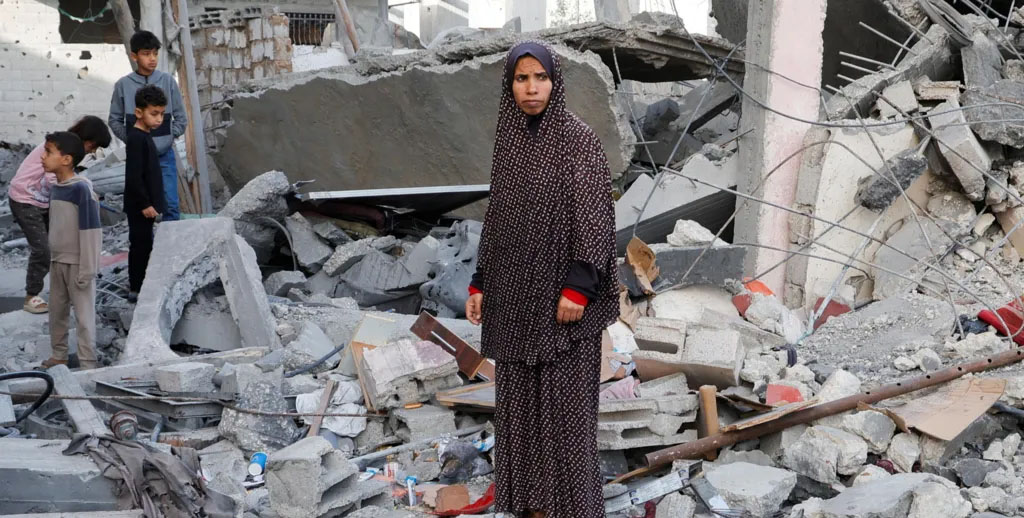
Deadly strikes in Gaza as Netanyahu says Israel will seize new military corridor
Israel’s prime minister has said it is expanding its Gaza offensive and establishing a new military corridor to put pressure on Hamas, as deadly Israeli strikes were reported across the Palestinian territory.
Benjamin Netanyahu said Israeli forces were “seizing the Morag Corridor” – a reference to a former Jewish settlement once located between the southern cities of Rafah and Khan Younis.
Earlier, his defence minister said troops would seize large areas for “security zones”.
Meanwhile, 19 Palestinians, including nine children, were killed in an air strike on a UN clinic-turned-shelter in the northern town of Jabalia, a local hospital said. Israel’s military said it targeted “Hamas terrorists”.
Strikes across Gaza on Tuesday night killed at least 20 people, according to hospitals.
The Hamas-run Civil Defence agency said its first responders recovered the bodies of 12 people, including women and children, from a home in Khan Younis.
Rida al-Jabbour said a neighbour and her three-month-old baby were among the dead.
“From the moment the strike occurred we have not been able to sit or sleep or anything,” she told Reuters news agency.
The Israeli military said it was looking into the reports.
There were also reports of extensive bombardment along the border with Egypt overnight.
READ ALSO:
- Wike congratulates Okpebholo on tribunal victory
- FG orders immediate reopening of independence bridge in Lagos to ease traffic
- Protect vulnerable Nigerians, IMF tells Tinubu
The Civil Defence said the strike in Jabalia on Wednesday morning hit two rooms in a clinic run by the UN agency for Palestinian refugees (Unrwa) which was being used as a shelter.
Video verified by the BBC showed dozens of people and ambulances rushing to the building. Smoke was seen billowing from a wing where two floors appeared to have collapsed.
Unrwa’s commissioner-general, Philippe Lazzarini, wrote on X that the building was previously a health centre that it had been heavily damaged earlier in the war.
“Initial reports indicate the facility was sheltering over 700 people when it was hit,” he said, adding that a two-week-old baby was reportedly among the dead. “Displaced families stayed at the shelter after it was hit because they have nowhere else to go.”
Lazzarini said too many Unrwa premises had reportedly been used for fighting purposes by Palestinian armed groups or Israeli forces, and warned that the “total disregard of UN staff, premises or operations is a profound defiance of international law”.
The Israeli military said that it targeted Hamas operatives who were “hiding inside a command and control centre that was being used for co-ordinating terrorist activity and served as a central meeting point”.
It said “numerous steps were taken to mitigate the risk of harming civilians, including the use of aerial surveillance and additional intelligence”.
Hamas denied that its fighters had been using the building.
Fadel Ashour said he had been at the al-Ahli hospital in Gaza City when some of those wounded by the Jabalia strike were brought there for treatment.
“This shelter is home to many people, and every time the Israeli army bombs it, everyone inside is harmed,” he told BBC Arabic’s Gaza Lifeline programme.
READ ALSO:
- Ex-NYSC DG Tsiga regains freedom after 56 days in captivity
- Notorious bandit leader Bello Turji goes berserk, kills 12 to celebrates Eid
- Uromi killings: Deputy Senate President donates N16m to victims’ families
On Wednesday evening, Israel’s prime minister said in a video statement that the IDF had “switched gears” overnight and was “seizing territory, striking the terrorists and destroying the infrastructure”.
“We are also doing something else: We are seizing the Morag Corridor. This will be the second Philadelphi, an additional Philadelphi Corridor,” Netanyahu added, referring to a strip of territory running along the Egyptian border that the Israeli military seized last May.
Dividing Gaza, he said, would increase pressure on Hamas “step by step” and force the group to hand over the 59 hostages it is still holding in Gaza, 24 of whom are believed to be alive.
“As long as they do not give them to us, the pressure will increase until they do.”
Israeli Defence Minister Israel Katz had announced earlier that the military would be expanding its offensive to clear and “seize large areas that will be added to the security zones of the State of Israel”, without saying where they would be. He added that it would require a “large-scale” evacuation of Palestinians.
Katz also urged Gazans to act to remove Hamas and free remaining Israeli hostages, without suggesting how they should do so.
The Hostages and Missing Families Forum in Israel, which represents many hostages’ relatives, said they were “horrified to wake up” to the news of the expanded military operation. It urged the Israeli government to prioritise securing the release of all the hostages.
This week, Israel’s military has ordered an estimated 140,000 people in Rafah to leave their homes and issued new evacuation orders for parts of northern Gaza.
Israel has already significantly expanded a buffer zone around the edge of Gaza over the course of the war, and seized control of a corridor of land cutting through its centre, known as the Netzarim Corridor.
Israel launched its renewed Gaza offensive on 18 March, blaming Hamas for rejecting a new US proposal to extend the ceasefire and free the remaining hostages. Hamas, in turn, accused Israel of violating the original deal they had agreed to in January.
The humanitarian situation across Gaza has dramatically worsened in recent weeks, with Israel refusing to allow aid into the Gaza Strip since 2 March – the longest aid blockage since the war began.
Last month, the UN announced it was reducing its operations in Gaza, one day after eight Palestinian medics, six Civil Defence first responders and a UN staff member were killed by Israeli forces in southern Gaza.
The Israeli military launched a campaign to destroy Hamas in response to an unprecedented cross-border attack on 7 October 2023, in which about 1,200 people were killed and 251 were taken hostage.
At least 50,423 people have been killed in Gaza during the ensuing war, including 1,066 over the past two weeks, according to the Hamas-run health ministry.
Additional reporting by Rachel Hagan in London
Deadly strikes in Gaza as Netanyahu says Israel will seize new military corridor
BBC
International
Democrats drag Trump to court over election overhaul order

Democrats drag Trump to court over election overhaul order
The Democratic Party has sued the Trump administration over an attempt to impose sweeping changes on the election systems, including requiring citizenship proof to register to vote and limiting mail-in ballot counting.
In a lawsuit filed Monday, the Democratic Party asked a federal court to block the executive order, which prevents states from counting mail-in ballots that arrive after election day. The president’s directive also requires proof of citizenship to be presented — through documents such as a passport — when registering to vote.
“The President does not get to dictate the rules of our elections,” said the lawsuit filed in Washington by the Democratic National Committee, Senate Minority Leader Chuck Schumer, House Minority Leader Hakeem Jeffries and others.
“The Executive Order seeks to impose radical changes on how Americans register to vote, cast a ballot, and participate in our democracy—all of which threaten to disenfranchise lawful voters and none of which is legal,” it added.
After signing the March 25 order, called “Preserving and Protecting the Integrity of American Elections”, US President Donald Trump described it as “the farthest-reaching executive action taken” to secure US elections.
READ ALSO:
- If anything happens to me, hold Akpabio, others responsible – Natasha
- Breaking: ‘Cancel your homecoming’ — Police tell Senator Natasha
- Lightning strike kills herder, 12 cows in Kaduna
Trump, who does not acknowledge his defeat in the 2020 presidential election, has long questioned the integrity of the US electoral system. He has repeatedly and baselessly amplified conspiracy theories about massive election fraud in the United States, particularly involving absentee voting.
Legal scholars swiftly denounced Trump’s election order as an abuse of presidential power that could prevent millions of eligible voters from casting ballots.
Advocacy groups led by the Campaign Legal Center and State Democracy Defenders Fund filed a separate lawsuit on Monday against the same executive order.
“The president’s executive order is an unlawful action that threatens to uproot our tried-and-tested election systems and silence potentially millions of Americans,” Danielle Lang of the Campaign Legal Center said in a statement.
“It is simply not within the president’s authority to set election rules by executive decree, especially when they would restrict access to voting in this way.”
Democrats drag Trump to court over election overhaul order
AFP
-
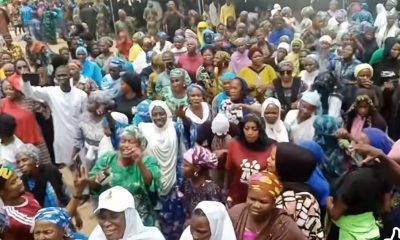
 metro2 days ago
metro2 days agoBREAKING: Senator Natasha defies restrictions, arrives homecoming rally by helicopter [VIDEO]
-
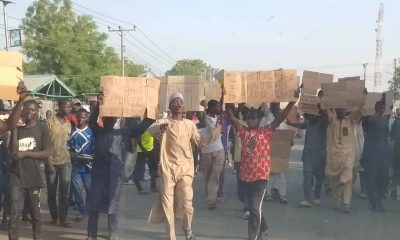
 metro2 days ago
metro2 days agoUromi: Edo residents flee towns over likely reprisal attack, arrest
-

 metro2 days ago
metro2 days agoBreaking: ‘Cancel your homecoming’ — Police tell Senator Natasha
-
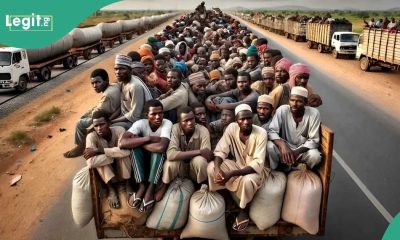
 metro3 days ago
metro3 days agoHow they murdered my Kano-bound passengers in Edo
-

 metro3 days ago
metro3 days ago‘I was offered N5bn bribe to impeach Fubara’
-

 metro1 day ago
metro1 day agoBreaking: Tinubu sacks Kyari, appoints Ojulari as new NNPCL GCEO
-

 metro2 days ago
metro2 days agoAmosun, Adeola engage in verbal attack over project diversion allegation
-

 metro3 days ago
metro3 days agoKano Gov Yusuf, Sanusi linked to Eid killings

